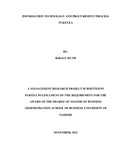| dc.description.abstract | The main objective of the study is to asses’ the impact of information technology on
procurement process in Kenya. Organizations today continue to face business related
problems like collection of timely reliable and accurate information, processing, storing,
and retrieval for decision making and control of the organization. The application of
information technologies to procurement processes will change the way work is
performed, the number and skills of contracting personnel, and the procurement
organization's structure. Procurement plays a major role in organizations, which can
significantly influence a company’s success. As a core function it is, however, subjected
to the mega trends of the market. Its day to day existence is very much defined by
growing procurement volumes due to greater concentration of business on core
competences, globalization of procurement markets, growing market dynamics as well as
the ever shorter product lifecycle. For a procurement organization to operate both
efficiently and effectively in such a complex environment useful structures need to be
created and suitable instruments put to use. Information technology can have an
important function in this regard. Used appropriately it can offer: smoother and faster
process flow, efficient distribution of information, decentralization of tasks and decisions,
increased transparency and better control. In addition, information technology helps not
only to support internal processes, but also those involving business partners. The
research design used descriptive survey method aimed at establishing the impact of
information technology on procurement process in Kenya for companies listed in Nairobi
Securities Exchange. The study used stratified random sampling technique to select a sample of 37 employees from a population of 124. Questionnaires were distributed and
30 were fully completed and returned. This formed 81% of the population and it was
found to be sufficient for the study. The study concludes that, the ability to use
technology to improve the contracting process depends in part upon co-operation
between the organizations that maintain data and organizations that use the data.
Procurement systems promise to bring organizations one step closer to a scenario of
integrated, yet modularized systems, which are flexible enough to handle all the different
kinds of purchasing routines an organization usually has in place. | en |

